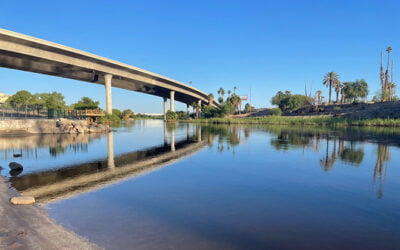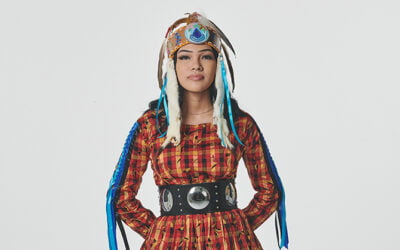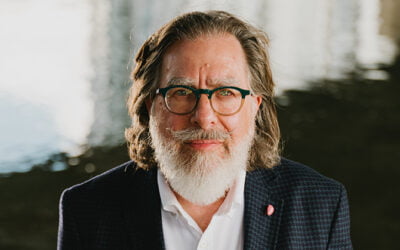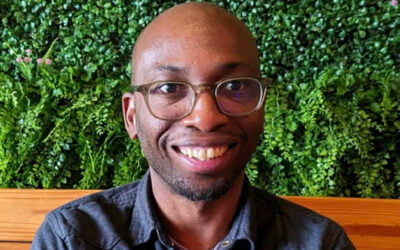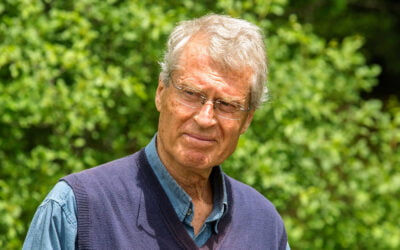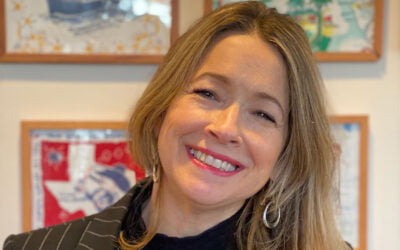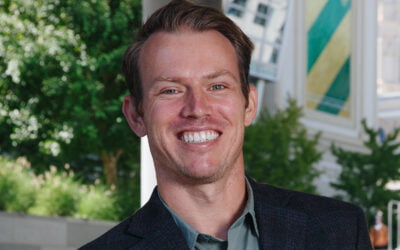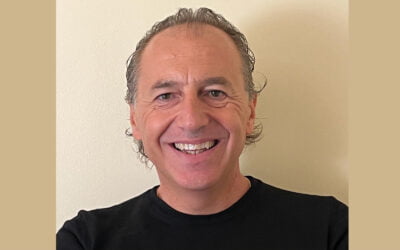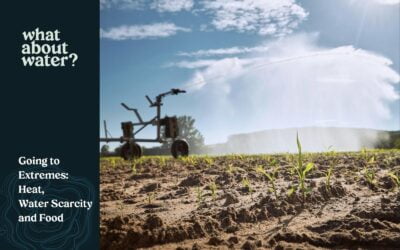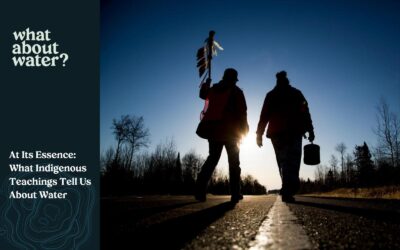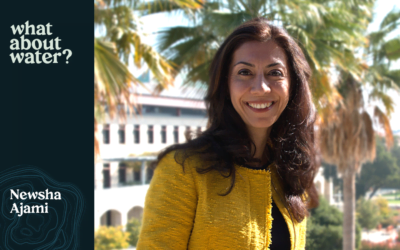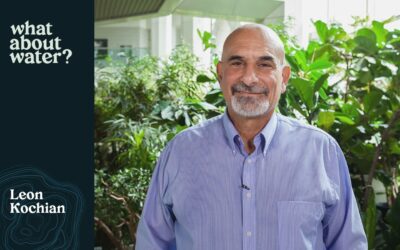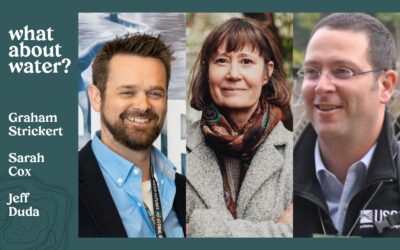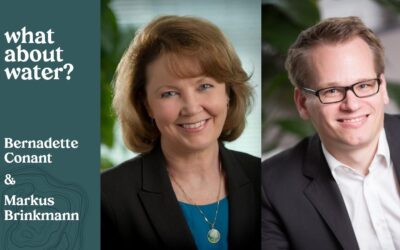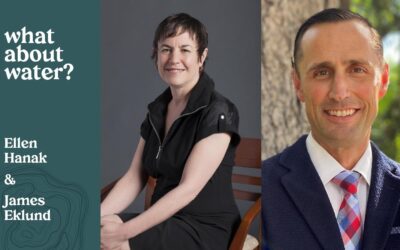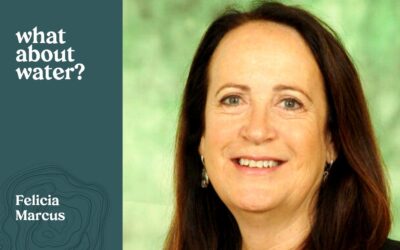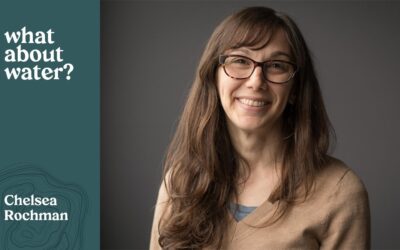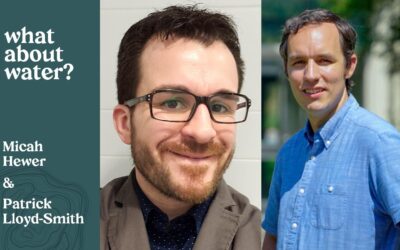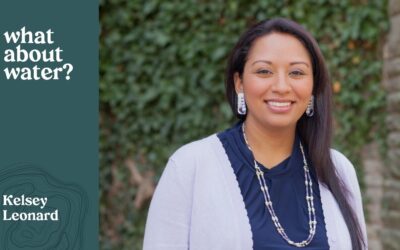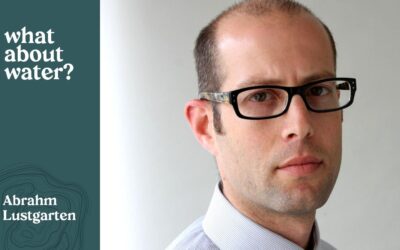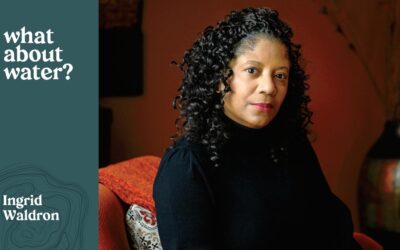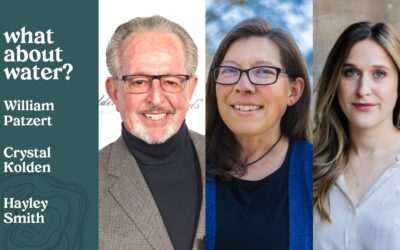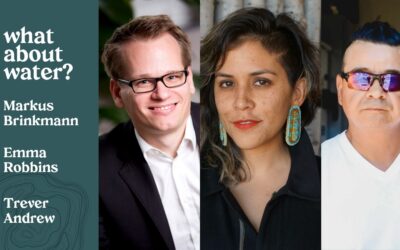
Podcast Episodes
Season 4
&
Summer 2023
Our planet is in crisis. When it comes to water, there are many promising solutions. But in a world full of new technologies, what innovations should we pay attention to? And will they be enough?
On Season 4 of What About Water? we’re diving into New Technologies, Water Realities. Host Jay Famiglietti will sit down with the experts, innovators and big-picture thinkers who are helping preserve and protect our freshwater.
Each new episode, we’ll look at how human-made solutions can both help and hurt us as we tackle our biggest water challenges. And we’ll explore everything from ideas found in nature to digital media, data and shiny new tech.
Drilling Deeper Won’t Fix This
We continue our look at the Colorado River – this episode, we hear from: Stephen Q. Miller, Kathryn Sorensen, Will Hewes, Todd Brady, Kathleen Ferris, Patrick Adams, and Kathy Jacobs.
The Colorado River’s Alfalfa Problem
A critical source of water for roughly 40 million Americans, we look at why so much of the Colorado River’s freshwater goes toward growing water-intensive hay crops, and at what can be done to significantly scale back consumptive use in the future.
World Water Day 2023 with Autumn Peltier
In this bonus episode for World Water Day 2023, Autumn Peltier and Jay discuss the way her life shifted as she started campaigning for clean water.
Will Sarni: Can We Tech Our Way Out of Wicked Water Problems?
Can we really “tech” our way out of the world’s water crises? In our Season 4 finale, we’re asking the big question of the season – will water technology be enough to solve wicked water problems?
What Lurks Beneath: How Robots Can Save City Plumbing with Vanessa Speight
In this episode, we’re going underground, undersea and into your water and sewer pipelines with science fiction’s favorite problem-solvers…robots!
An AI Fix for Aging Water Systems with Seyi Fabode
On this episode of What About Water? an entrepreneur in Austin, Texas turns his dishwasher sensor into a tech startup that’s giving water utilities a picture of their water quality in real time.
Chemical Cocktails: What’s in our Groundwater? with John Cherry
Jay sits down with the father of contaminant hydrogeology, Dr. John Cherry, to talk about the water under our feet, and how we can better monitor it.
Dirty Laundry: Water and the World of Fast Fashion
Call the fashion police! In this special holiday edition of What About Water? we dive into the apparel industry’s dirty secret: its water use.
Into Thin Air: A Smarter Way to Water Crops, with A.J. Purdy
How can we measure water when it disappears into thin air? On this episode, we’re looking at evapotranspiration, or “ET” for short.
Submerged: Indigenous Communities and Mega-Hydro Projects
In our first-ever documentary “Submerged”, we hear the different ways Indigenous communities bear the brunt of mega hydroelectric projects.
Field Smarts: Protecting Farmers’ Wallets and Our Water, with Bruno Basso
It’s estimated that by 2050, we’ll have over 9 billion people on earth. To feed everyone, we will need to produce 60 per cent more food – and we’ll have to do it using less water. On this episode of “What About Water?” we’re looking at new technology that can make that shift possible.
Under the Sea: Hidden Freshwater Reserves with Brandon Dugan
With a number of our freshwater resources on land receding, is it time to look to the ocean – or, rather, underneath it for fresh water?
Running Dry: Nik Kowsar on Iranian Censorship and Water Scarcity
For Nik Kowsar, civil unrest in Iran is not new. In this episode, Nik shares how he harnesses the power of media and technology to spread the word about water issues in his home country.
Water Affects Your Pension: Cate Lamb at World Water Week
Can water risk disclosure move the needle on corporate water stewardship? And what does it have to do with our own retirement funds? In this very special episode of What About Water? – recorded on location at World Water Week – Jay sits down with Cate Lamb in Stockholm, Sweden to discuss valuing water. We hear how companies with high water-related risks affect our own bottom line, and how pensions hang in the balance when the value of those companies erode in the face of climate change.
‘Don’t Mess With the Data’: Virginia Burkett on Louisiana’s vanishing coastline
In the first episode of our fourth season, Jay sits down with renowned scientist and IPCC author, Virginia Burkett, to talk about technology, its pitfalls and its promises for a water-secure future.
Season 3
It’s been said water is the primary medium through which we feel the effects of climate change. From flooding and drought, to the way we use and consume this precious resource in our everyday lives – every drop counts. Which is why in our third season we’re taking a look at solutions to our world’s most pressing water problems. From cutting-edge technologies to tapping into traditional knowledge, how are we adapting to new water realities and to a changing planet?
Can Peace and Prosperity Flow from Water?
What happens when tensions over water reach their boiling point? In our final bonus episode of the summer season, we explore the causes of water conflicts and what we can do to stop them.
Engineering a New Water World
In our third bonus episode of the summer season, we look back at some of the most innovative ways people are sourcing their freshwater, from building home water systems in the Navajo Nation to engineering a state of the art wastewater treatment facility in Orange County. We learn how different communities are finding innovative solutions to recycle and reuse their water supply. We also hear what improvements need to be made to aging water infrastructure and how nature-based solutions are key to restoring the damage that over-engineering has done.
Going to Extremes: Heat, Water Scarcity and Food
From farmer’s fields to the high arctic, from your morning cup of coffee to a glass of wine – everything we eat and drink depends on water. In the second episode of our summer mini season, we draw from our past interviews about water scarcity and its effect on our food supply.
At Its Essence: What Indigenous Teachings Tell Us About Water
In our first mini-episode of the summer season, we turn to three guests from our past seasons to explore Indigenous ways of knowing, and to look more closely at the sacred nature of water — how various people understand it, conserve it and co-exist with it.
The Girl who Wanted to Swim: Tackling Sewage at the Source
On our final episode of Season 3, we hear how a 6th grade science fair project led to receiving the Order of Nova Scotia for youth environmentalist and clean water advocate, Stella Bowles. At just 11 years old, Stella learned about the 600 straight pipes flushing unprocessed sewage from homes directly into the river behind her home, the LaHave. What started as a science fair project catapulted her community – and all three levels of government – into action to clean up the LaHave. Now 18 years old and $15.7 million in government funds allocated later, Stella sits down with Jay to share her story.
Water Pipes to Water Rights: Protecting Water with Newsha Ajami and Carolina Vilches
This week on What About Water?, we look at water infrastructure – from broken water pipes across America to the redistribution of water rights in Chilé – and what role governments play in fixing the systems that distribute our water.
Good to the Last Drop? Coffee & Climate with Aaron Davis
Coffee is one of the most widely-consumed beverages in the world. But with climate change threatening the two species that make up the global market, could that change? Coffee scientist and researcher Dr. Aaron Davis says even with rising temperatures, and more drought — that doesn’t have to be the case. This week on What About Water? we hear why reintroducing forgotten wild coffee species will be the key to growing climate-proof coffee.
Tasha Beeds: Walking With Water
On this episode of What About Water? we’re learning from traditional knowledge. Jay sits down with Tasha Beeds, a grassroots Indigenous academic and Water Walker. She takes us through the origins of Water Walking – an Indigenous ceremony recognizing and connecting with water. Beeds enters into ceremony for the water – discussing what it means to raise consciousness about water as a living entity.
The Sea Also Rises
On this episode of What About Water? we take a look at the state of our rising seas from space, and learn what coastal communities on the ground are doing to adapt. Jay speaks with long-time colleague Steve Nerem, a Principal Investigator on NASA’s Sea Level Change team.
Debunking ‘Toilet to Tap’, with Mike Markus
With climate change threatening freshwater sources, water demand across the globe is likely to increase by 20 – 30% between now and 2050. In this episode, we’re looking at two promising solutions to create clean drinking water from surprising places: our sewers and oceans.
Boiling Point: Water, Borders and Conflict with Aaron Wolf
Transboundary waters – the rivers, lakes, and aquifers shared by two or more countries – are found in 153 of the world’s 192 countries, accounting for an estimated 60% of global freshwater flow. As a critical component of our survival, water has long been a source of conflict between nations. But the stakes are higher with a rapidly increasing population and threats of water scarcity. In this episode, we talk to Aaron Wolf, a trained mediator and Professor of Geography in the College of Earth, Ocean, and Atmospheric Sciences at Oregon State University, about transboundary cooperation as a useful tool for adaptation.
“Those portfolios will tank”: Mindy Lubber, money and water
We’re already reaping the financial repercussions of climate change. Four Twenty Seven projects that by 2040, roughly $78 trillion, equivalent to about 57% of the world’s current GDP, will be exposed to flooding. On this episode of What About Water? we ask the question: can market incentives align with climate priorities? And how do we hold big corporations accountable?
Replenishing a Broken Water Cycle
For centuries, we have built big dams, reservoirs, and levees. Humans have steered and shaped the flow of water to irrigate deserts, prevent floods and access groundwater. But through big engineering, we’ve also created breaks in the natural flow of freshwater from source to sea. The good news is: we can look to nature for solutions to fix it.
Growing Food in Dry Times: Drought in the West
Jay talks with Global Institute for Food Security Associate Director, Leon Kochian, about the challenges and potential solutions that can help farmers adapt to water scarcity in agriculture. We also hear from two farmers on the ground – Merle Massie and Reg Lowe – who are experiencing the impacts of this year’s drought first-hand.
On Thin Ice: Iqaluit’s Water Crisis
In this episode we visit the city of Iqaluit in Canada’s northern territory of Nunavut, which is battling a water crisis on multiple fronts.
Janet Pitsiulaaq Brewster, on leave from her role as Deputy Mayor of Iqaluit, shares how the people of Iqaluit are coping with these water challenges and what they mean for the traditional Inuit way of life.
Climate Change Hope with Katharine Hayhoe
We bring Katharine on the podcast for our first episode of the third season to discuss reframing the climate conversation and the foundation for real climate hope: action.
Season 2
This season, host Jay Famiglietti sits down with some of the world’s leading experts to once again talk about water and learns why some marginalized communities are denied safe water access, how flooding and droughts may end up forcing billions of climate refugees to flee their homes, which regulations have been gutted and need to be brought back to save us from disaster and more. Join us as we dive into our waters at home and abroad, confront the dangers they face, and learn how to save them.
DamNation! (Bonus Episode)
Join our guest host, Professor Graham Strickert, as he hosts a panel of experts to discuss the pitfalls and problems of hydropower dams. Inspired by our screening of the award-winning Patagonia film “DamNation.”
Oh crap! COVID-19 In Our Wastewater?! (Bonus Episode)
Join us as some of Canada’s leading water scientists and experts discuss how testing wastewater for SARS-CoV-2 can help us detect emerging community outbreaks. It’s a dirty subject that is saving lives.
The Cost of Climate Migration (Bonus Episode)
Climate change has a price. In this bonus episode (recorded on Earth Day) our host Dr. Jay Famiglietti has a live virtual roundtable with three experts, each with a unique perspective on this multifaceted topic.
Valuing Water (Bonus Episode)
Valuing water is about much more than price. In this bonus episode (a condensed version of our Let’s Talk About Water virtual forum on World Water Day), Jay talks with three individuals each with a unique perspective on valuing water. Featuring Kirsten James (Ceres), Gidon Bromberg (EcoPeace Middle East), and Dr. Karen Kidd (McMaster University).
Towards a Greener, Better World with Jeffrey Sachs: A New Mindset for a New Millenium
World-renowned economist Dr. Jeffrey Sachs believes humanity can leap forward with science and technology – but only if we drop our primeval addiction to war and conflict.
Liquid Assets: Water on Wall Street
Colorado water lawyer James Eklund and California water policy expert Ellen Hanak talk to Jay about the future of water — or rather, about water futures. Water futures and securities are increasingly valuable investments.
Broken Promises, New Solutions: A First Nations-led Approach to End Water Advisories in Canada
For thousands of years, Indigenous North Americans drank some of the world’s purest drinking water. Then came colonization and government neglect. First Nations’ water quality fell and, with it, their health. But as Jay learns, change is coming thanks to Indigenous Water Protectors, like Deon Hassler, a teacher of water treatment plant operators for the File Hills Qu’Appelle Tribal Council, and helpers, like Bob Patrick, a water expert at the University of Saskatchewan.
A Conversation With Felicia Marcus
In this episode, Jay talks with an old friend about hope: hope for cleaner and safer water in America. Felicia Marcus is an attorney/consultant who has served in government, the non-profit world, and the private sector. She’s been a board member on numerous national and international bodies, including one that oversees Canada-U.S. water issues.
Plastics are Forever
Dr. Chelsea Rochman, an associate professor at the University of Toronto, says plastic, everyone’s favourite cheap and easy resource, comes with a high price. Microscopic pieces of plastic flake off every time we wield a disposable bag, or wash a polyester sweater, or any number of things. They permeate our water, air, soil, bodies, even unborn foetuses. It’s a problem that will plague humans for untold generations unless, she says, we take aggressive action to control our plastic addiction.
Slippery Slopes: Canadian Recreation Meets Climate Change
Climatologist Micah Hewer and economist Pat Lloyd-Smith tell Jay about the good, the bad, and the ugly effects of global warming on Canada’s outdoor recreation sector.
Brother Ocean, Sister Lake: Why Bodies of Water Deserve Respect and Human Rights
Dr. Kelsey Leonard, an associate professor at the University of Waterloo and member of the Shinnecock Nation, discusses how Indigenous views on the personhood of water can save that water. More and more bodies of water around the world are being granted legal personhood status, which gives them the right to be defended from industrial pollution. Dr. Leonard is fighting to make water justice a priority across government and bridge the gap between Indigenous belief and Western law.
Bide(n) time for America’s Water Resources with Peter Gleick
Dr. Peter Gleick, co-founder and president emeritus of the Pacific Institute, believes Joe Biden could be the man to save American water policy, which has been foundering under Donald Trump. In his co-authored policy brief, Water Recommendations to the Next President, Gleick and his colleagues lay out the biggest issues with US water safety and access, and what President Elect Biden needs to do to guarantee continued clean water for all Americans and limit the global repercussions of climate change.
Groundwater: ‘Go Deep or Go Dry’ is Unsustainable
Debra Perrone, Assistant Professor UC Santa Barbara, discusses the dwindling groundwater supply affecting 12 million US wells caused by global warming and over-consumption. The world relies on groundwater, which is getting harder and harder to find. With groundwater close to the surface vanishing, well-drillers are forced to turn to deep drilling for corporate, agricultural, and domestic water needs. But going deep this way is far more expensive and increasingly yields contaminated water.
The Great Climate Migration with Abrahm Lustgarten
Abrahm Lustgarten, a Pulitzer Prize-nominated environmental reporter, talks to us about climate migration, one of climate change’s biggest looming threats. Rising temperatures, rising sea levels, and ever-increasing natural disasters are forcing people to abandon their homes and their ways of life to seek safer ground. As the planet heats up, the number of climate refugees will just keep swelling, up to 3 billion people — a third of the global population — by 2070.
How Environmental Racism Pollutes Marginalized Communities
Up until a few years ago Ingrid Waldron was best known in her province for teaching sociology at Dalhousie University and advocating for members of the African Nova Scotian community and Indigenous people. Waldron argued these marginalized people were victims of environmental racism, who for centuries were forced to drink tainted water, breathe polluted air and live next to waste dumps. Now those concerns are reaching national and even global audiences, and change is happening in Nova Scotia.
California Drying, California Burning
In this episode of “What About Water?” California is burning. And Oregon. And Washington State. And not only are mega wildfires in the U.S. threatening – and sometimes taking — lives and property there, they’re pumping smoke and fallout high into the atmosphere that has spread to Canada and even entered European air space.
COVID-19 and Our Water Supply
What is the impact of COVID-19 on our water supply? As we learn on the Season 2 debut of “What About Water?” scientists’ initial fears the virus could be waterborne, as well as airborne, have lessened. But as it has in just about every other aspect of our lives, COVID has affected how we understand and use water.

